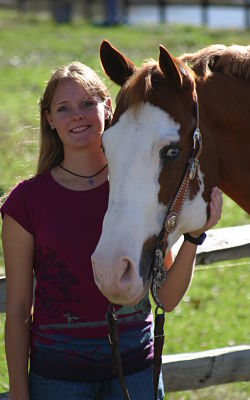 Hometown:
Hometown: - Colorado Springs, Colorado
Undergraduate Degree and Major:
- B.A. in Biochemistry/Molecular Biology (individualized program)
Undergraduate University/ College:
- Hastings College (Nebraska)
Degree Seeking:
- PhD
Year in School:
- 4 ½ years
Anticipated Graduate Date:
- Fall 2015
Graduate Research Group:
- GCMB
Faculty Mentor/ Lab you work in:
- Dr. Audrey Atkin
Tell us something about your research project.
My research focuses on wild-type mRNAs that are regulated by the Nonsense Mediated mRNA Decay pathway in the model organism Saccharomyces cerevisiae.
What is your favorite class or activity related to biology?
My favorite Biology class as an undergraduate was Cell Biology and as a graduate student was Immunology. My favorite activity related to Biology is learning about all of the cool things different organisms are capable of doing! I also enjoy looking at fluorescence microscopy images and data.
How do you plan to incorporate outreach and service into your academic career?
My favorite outreach and service activity is judging science fairs! I love to judge science fairs—interacting with, and potentially influencing, young minds is fun and rewarding. I like Middle School and High School science fairs, but my favorite are the Elementary Schools. I have also had the opportunity to help with Lincoln’s Regional Science Fair at the Lancaster Events Center, and plan to continue to do these types of things no matter where my career takes me. Additionally, I enjoy helping with public science events such as Sunday with a Scientist—I like to teach the community more about why Science is awesome!
How you balance your study and life?
Balance between studying/lab work and personal life is hard in graduate school, but important. Sometimes getting away from the lab, even just for a few hours, can clear your thoughts and help you be more productive when you return. I have many extracurricular activities I enjoy doing outside of lab so it presses me to be more efficient and productive while I am in lab. I give myself goals (benchmarks) to reach by the end of each week to ensure my research is making steady progress. While in lab I am challenged to use my time wisely and run multiple experiments at once intermixing them during down time and incubations. This allows some free evenings and free time on weekends to do the other things I enjoy as well.
What do you do while not working in the lab?
When I am not in the lab I can be found doing something active almost all of the time. My passion is riding horses—I have shown Paint Horses my entire life, so I spend much of my time at the barn. I also play racquetball, softball, and bike. Occasionally, I shingle houses with my husband or help with other random construction jobs for which he needs an extra set of hands.
What’s the best advice you’ve ever received?
When life seems overwhelming just take it one day at a time, everything always works itself out in the end. Don’t forget to breathe and enjoy the ride, even when it gets bumpy!
What you plan to do after you get your PhD?
I have not set my mind on any particular career path at this point. I like to keep my options open and remain flexible. I am open to a career in academia, industry, or small college teaching. I really enjoy teaching, so would like to keep that a part of my career regardless of where I end up. If I choose the academia route I would like to pursue autoimmunity and Type 1 Diabetes research.
From your perspective, what qualities are important for a researcher/future academic?
The most important qualities I believe are important for a researcher are:
- The ability to design a realistic research plan with specific goals and a map of how to accomplish those goals in a given time
- The ability to be flexible and adapt to change as new data and techniques become available
- The desire to never stop learning (which I think is a commonality that draws us all together in the first place J)
- The ability to mentor people—I believe this is a key creating a successful work environment in the lab
- The ability to communicate—results, ideas, problems, concerns, planning—good communication is essential in every field!
What professions other than biological sciences would you like to attempt?
I have an interest in Biotech, Bioengineering, and in becoming a professional Equestrian. I also wouldn’t mind trying Architecture at some point in my life.
What three adjectives best describe you?
I had to ask my lab partner for help on this and we came up with:
- Detail oriented
- Adventurous
- Determined
April 2014